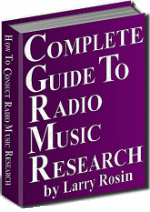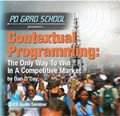 Loading... Please wait...
Loading... Please wait...Categories
- Best of Breed
- Special Discount Price
- Limited Copies Available
- Package Deals
- Audiobook Narration
- Public Radio
- Radio & Social Media
- Radio Air Talent Development
- Radio Airchecks (Audio)
- Radio Career Advancement
- Radio Comedy
- Radio Copywriting
- Radio E-Books
- Radio Imaging
- Radio Jingles
- Radio Management
- Radio Morning Shows
- Radio Personality
- Radio Production
- Radio Production Libraries
- Radio Production Libraries (INSTANT DOWNLOAD)
- Radio Programming
- Radio Promotions
- Radio Research
- Radio Sales
- Radio T-Shirts
- Radio/Voiceover DVDs
- Radio/Voiceover Videos
- Radio Show Prep
- Internet
- Voiceover
- Home
- Radio Programming
- COMPLETE GUIDE TO RADIO MUSIC RESEARCH by Larry Rosin (E-Book)
- Home
- Radio Research
- COMPLETE GUIDE TO RADIO MUSIC RESEARCH by Larry Rosin (E-Book)
- Home
- Radio E-Books
- COMPLETE GUIDE TO RADIO MUSIC RESEARCH by Larry Rosin (E-Book)
Product Description
THIS PRODUCT CONSISTS OF A 70-PAGE PDF "E-BOOK," WHICH YOU CAN DOWNLOAD IMMEDIATELY UPON PURCHASING.
THIS IS NOT AVAILABLE AS A PRINTED BOOK OR OTHER "PHYSICAL" PRODUCT.
A Personal Message From Dan O’Day
I’ll admit it: I’m biased.
Larry Rosin, President of Edison Media Research, is my favorite researcher.
Why?
Partly because he loves radio, loves music, and loves research.
Partly because he’s honest:
He perceives his professional responsibility not as confirming his client’s preconceived notions but, instead, as gathering and helping to interpret the most objective information possible.
Partly because whenever I have a research-related question, Larry always is quick to respond with a precise, unequivocal answer.
Partly because he doesn’t confuse “Research” with “Programming”:
He views research as a valuable tool to assist the programmer — not as a replacement for judgment, creativity or talent.
Mostly because he’s just so darned good at it.
If you use an outside research firm, THE COMPLETE GUIDE TO RADIO MUSIC RESEARCH will help you get more out of the information you’re already receiving.
It also will help you avoid wasting your time with meaningless questions or questionable methodologies.
If you already conduct your own in-house research, this book offers benchmarks against which to compare your methodology.
If you’re about to hire an outside research firm, after reading this book you’ll be able to ask much more relevant questions when interviewing prospective research “vendors.”
And if you’re about to launch your own in-house research, THE COMPLETE GUIDE TO RADIO MUSIC RESEARCH will help you avoid any number of wasteful, distracting, and harmful mistakes.
Who Needs This Book?
This book was written for people who hold one or both of the following job titles:
- Program Director of a music radio station
- Music Director
Why You Need This Book
Virtually every music-based radio station in the world already conducts some form of music research.
If you’re in a competitive market and for some reason you’re not already conducting music research, believe me:
Your competition is.
Do You Want To Please (And Increase) Your Audience?
The goal of music research is to maximize the likelihood that when your targeted listeners turn on your station, the song you’re playing is one that they want to hear.
Please go back and reread the previous sentence, because it contains an important clue:
Your goal is to identify the songs your listeners want to hear. Not just the songs that they “like.”
There are plenty of songs that listeners “like” but don’t want to hear very often, because they’re tired of hearing them. As you probably know, that’s called the “Burn Factor.”
Hit songs don’t “burn” because people stop liking them. They burn because people get sick of them.
(And then later on, they might become un-sick of them — and music research helps you identify the songs that are ready to be returned to an on-air rotation.)
Just Between You And Me....
When talking about music research with your station’s consultant....
Or with your Group Program Director....
Or with your Station Manager....
Or with your peers at radio conferences....
Do you ever hear terms thrown around that you’re not sure you completely understand?
Do you ever find yourself nodding your head, wisely — while secretly thinking, “Huh??”
Do you ever find yourself guessing at what a music research term means or guessing which methodology is best for your situation?
“Gee, everybody else in our industry seems to understand everything about music research. Where the heck did they learn all that stuff?”
And where were you when they learned it??
Here’s Their Secret.
They’re faking it.
Most radio programmers don’t know, for example, the difference between “Validity” and “Reliability.” So they use the words interchangeably — which is ridiculous.
A test can be highly reliable but completely invalid. And vice-versa.
I won’t keep you in suspense. I’ll tell you the difference right now:
“Validity” is a measure of how close the research comes to measuring what it’s supposed to measure.
“Reliability” is a measure of how likely it is that if you replicate that test with a similar test group, you’ll get the same results.
Let’s say you’re doing music testing for a Rap station in an effort to discover what songs are preferred by your target audience.
And you conduct a music test on 100 randomly selected white females, age 55 - 64.
And all the rap songs you test with that group score poorly.
Your test results probably will be extremely reliable: Test those same songs with another group of 100 randomly selected white females, age 55 - 64, and the results of Test #1 will be very similar to the results of Test #2.
So you’ll be conducting highly reliable music research.
But it certainly won’t be valid music research, because you haven’t selected your test subjects properly.
Obviously, you know not to test rap music on white females, age 55 - 64.
But the next time you hear some PD or MD boasting about his immense knowledge of music research, it might be fun for you to ask him to define those two terms.
Because when it comes to understanding how to use music research effectively, a lot of radio people are just faking it.
More importantly, THE COMPLETE GUIDE TO RADIO MUSIC RESEARCH will give you the understanding of what music research really is, how it works, and what it can (and cannot) do.
Your Defense Against Egghead Research Doubletalk
Just what you need:
Some geek in an ill-fitting suit, punching through a dizzying procession of PowerPoint slides filled with graphs, pie charts, and buzz words whose meanings you can only guess at.
Yes, it’s a Research Consultant. Here to get your company to sign on the dotted line and write a great big check.
After sitting through half a dozen such presentations from competing research firms without understanding most of what they said, ultimately you choose the company with the coolest PowerPoints.
After all, if they can create dazzling PowerPoints, they must be qualified to do your music research, right?
THE COMPLETE GUIDE TO RADIO MUSIC RESEARCH will give you the understanding necessary to evaluate the pitches you get from outside research firms. And the ability to ask the cold, hard questions required to make an intelligent choice.
Conducting Your Own Music Research?
THE COMPLETE GUIDE TO RADIO MUSIC RESEARCH will explain what you need to test and how to go about testing it.
THE COMPLETE GUIDE TO RADIO MUSIC RESEARCH will help you avoid the costly mistakes so commonly made by other radio stations
No Fancy Jargon.
Remember earlier when I talked about “Reliability” vs. “Validity”?
Relax.
THE COMPLETE GUIDE TO RADIO MUSIC RESEARCH isn’t written for the professional researcher. No fancy jargon to memorize. Not even “reliability” and “validity.
THE COMPLETE GUIDE TO RADIO MUSIC RESEARCH will define all the terms that you hear other radio people throw around.
But the book is written in plain English. For radio people, not Professional Number Crunchers.
Here’s What This Book Covers.
• Why Do Music Testing?
• How Music Testing Helps Ratings
• Increasing Your Own “Gut” Feeling
• Music Testing As Competitive Imperative
• Types of Research Done By Radio Stations
• Focus Groups
• Listener Panels
• Perceptual Studies
• Library Tests
• Auditorium Tests
• Evolution of Music Testing
• Testing Active vs. Passive Listeners
• Call-Out Research
• Screening
• Targets
• P-1’s
• Cumers
• Format Targets
• Artist Screening
• Full Sample vs. Rolling Averages
• Sample Sizes
• Call-Out: The Interview
• Call-Out: The Test
• Testing The Hook
• How To Identify The Hook
• Length of The Hook
• How Many Hooks Should You Test?
• Is Testing Hooks Valid?
• Rating Scales
• Four-Point vs. Five-Point Scales. (One is better than the
other. But most people choose the wrong one.)
• Burn
• Burn: Men vs. Women
• Evolution: Crude to Controlled
• Analyzing The Data
• Familiarity
• Popularity/Preference
• Targets and Demographics
• Holistic Analysis
• Ranking Your Data
• Drilling Deeper
• Trends
• Breakout Scores
• Pleasing The Core vs. Growing The Cume
• Show Segment Drivers
• What Call-Out Can’t Do
• Music Research via The Internet
• In-Home Testing
• Telephone Library Testing
• On-Air Library Tests
• Additional Test Questions
• Fits
• Identifying Artist & Title (Good idea or bad?)
• Song Correlation
• Screening Montages
• Cluster Analysis
• Essence Tests
• Post-Test Questions
• Dial Methodology
• Future Technology
• How Often Should You Test Your Library?
• Follow The Data, Not The Record Companies
• Portable People Meter
• Testing Remixes
• Testing Rap Songs
• Market Differences
If you program your station’s music, you must have this book in your library. Period.
THE COMPLETE GUIDE TO RADIO MUSIC RESEARCH is a 70-page e-book (PDF format), available for immediate download.
IMMEDIATE DOWNLOAD!
Immediate delivery! When you submit your order, you’ll be able to download this valuable book immediately.






